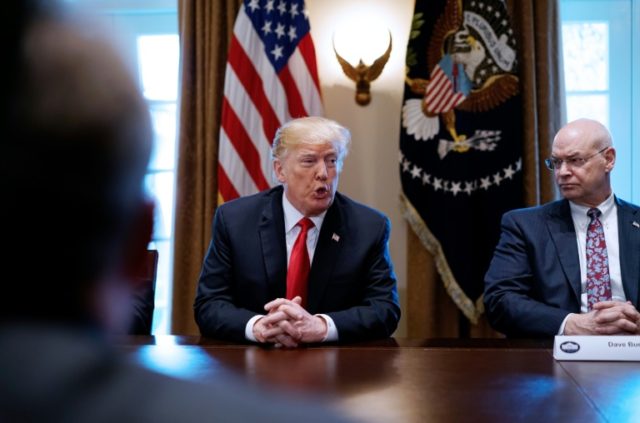Washington (AFP) – President Donald Trump’s sudden announcement last week of sweeping US tariffs on steel and aluminum imports has exposed a profound ideological rift among his top advisers.
Here are the main players in the White House battle over trade policy:
– Gary Cohn –
Derided by Trump’s far right supporters as “Globalist Gary,” Cohn is the director of the National Economic Council and represents the Wall Street wing of Trump’s economic team.
A former president of investment bank Goldman Sachs, he reportedly threatened to resign if Trump presses ahead with the steel and aluminum tariffs, which are supposed to be formally imposed later this week or early next.
Cohn hasn’t given up the fight yet, however. He reportedly bringing in representatives from auto and can manufacturers and the oil industry talk to Trump on Thursday about the impact of tariffs on their industries.
Cohn was a major booster of the president’s sweeping December tax cuts, but is out of synch with much of the president’s America First message and political base of support.
His free trade position enjoys support among Republican leaders, however, including House Speaker Paul Ryan, who also is working to head off the tariffs.
“We are extremely worried about the consequences of a trade war and are urging the White House to not advance with this plan,” said AshLee Strong, a spokeswoman for Ryan.
But Trump last week rejected the concern that tariffs would hurt the economy by raising prices, telling Cohn, “that’s not the real world,” according to CNBC.
– Peter Navarro, senior aide –
One of the rare economists to support Trump’s trade policies, Navarro was at Trump’s side last week when he announced the new aluminum and steel tariffs before industry executives at the White House.
Trump, who surprised his own staff with the announcement, then doubled down by tweeting that intends to impose “reciprocal taxes” on countries that impose duties on US exports.
Navarro gained prominence with his 2011 book with Greg Autry, “Death by China,” which reportedly drew the attention of Trump son-in-law Jared Kushner.
Navarro argues that China reaps huge trade surpluses at US expense through illegal subsidies and currency manipulation — charges he also levels at Germany.
Navarro was put under Cohn’s authority in a shakeup last year, but Trump has reportedly decided to promote the Harvard-trained economist to assistant to the president, marking the ascendancy of the trade hawks.
Republican Senator Orrin Hatch, chairman of the Senate Finance Committee, blames Navarro for Trump’s increasingly protectionist stance, The Washington Post reported.
“I think it would be a tragedy if they continue on the course that was announced,” Hatch said.
“I think he’s had some very bad advice,” he told reporters.
– Wilbur Ross, Commerce Secretary –
Unlike Trump’s secretaries of state and defense, Commerce Secretary Wilbur Ross supports and has become the public face of the president’s confrontational trade policy.
A former banker, Ross has also overseen a buildup of trade investigations into alleged dumping of products at artificially low prices and unfair subsides.
Ross brandished cans of Budweiser, Campbell’s soup and Coca-Cola on television last week to argue that any price rises from the tariffs would be negligible. The three companies oppose the tariffs as do can manufacturers and other businesses that rely on metals.
“I think this is scare tactics by the people who want the status quo, who’ve given away jobs in this country, who’ve left us with this enormous trade deficit and one that’s growing,” Ross told CNBC.
Many economists disagree, warning that the a retaliatory spiral would have serious repercussions on the global economy.
– Robert Lighthizer, US Trade Representative –
A long-time Washington trade attorney and China critic, Lighthizer previously served as deputy US Trade Representative under President Ronald Reagan in the 1980s. He points to Reagan’s moves to protect American industry with tariffs and quotas on steel, autos and semiconductors as a model.
Lighthizer is leading Trump’s efforts to renegotiate NAFTA. The talks have at times been acrimonious, with Canadian and Mexican officials flatly rejecting Washington’s demands including raising US content requirements for automobiles.
In a report in January, Lighthizer made the administration’s case that China should not belong in the World Trade Organization because it refuses to play by the trade body’s rules.
He said “the global trading system is threatened by major economies who do not intend to open their markets to trade and participate fairly.”

COMMENTS
Please let us know if you're having issues with commenting.